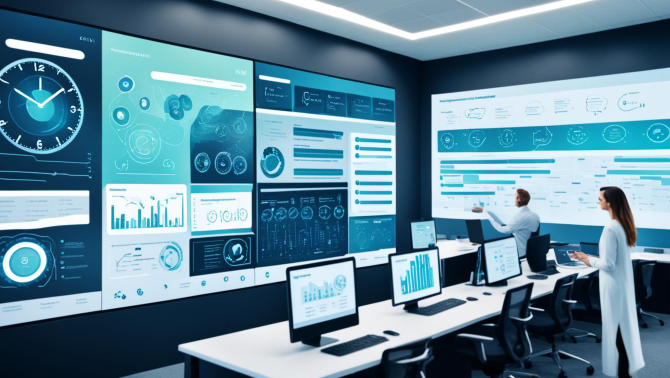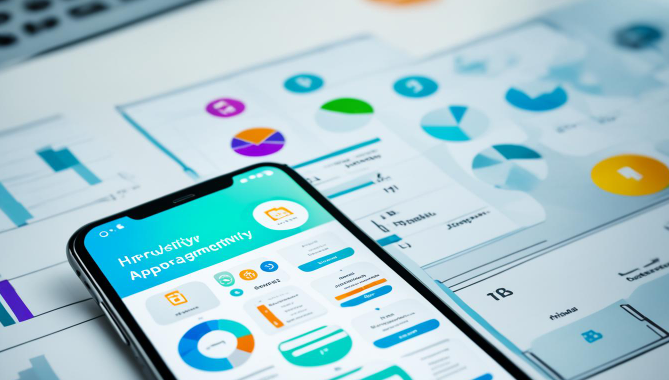Time management in HR is crucial because Human Resources (HR) professionals do many tasks. These include hiring, training, and dealing with employees. LaShawn Davis from The HR Plug says they may take on too much, causing chaos in their work. This overload often leads to poor time management, which can make them miss deadlines and affect customer satisfaction, says NIOSH.
Great time management skills and strong management skills are key for HR jobs. Simple steps like making a to-do list, setting priorities, and focusing on critical tasks, or even the most critical tasks, help a lot. Also, feeling good about each day’s progress, sharing tasks, and knowing there is no perfect balance are important. HR pros often juggle multiple tasks, switch between various tasks, and must complete tasks while protecting their personal life. Using time management techniques and learning how to delegate tasks effectively ensures they manage routine tasks better and protect time for high-priority tasks.
Trusting in self-care and understanding your limits are important, too. These habits support efficient time management and help HR professionals handle urgent tasks without burnout. They can also lower stress, raise employee satisfaction, and improve business growth. Managing time effectively is critical for HR success, especially as they must often maintain focus while navigating critical aspects of employee needs. Always learning and applying new tools — from project management software to time tracking apps — boosts time management efforts and helps HR teams move through the most critical aspects of their workloads with confidence.
Understanding the Importance of Time Management for HR Professionals
Time management is key for HR professionals to handle their roles well. These professionals work about 46 hours a week. Good time management techniques and strong management skills are needed to keep HR tasks running smoothly, make better decisions, and lower stress. HR teams also develop time management skills by learning how to break tasks into manageable steps and sequence their work time efficiently. Now, let’s look at how time management helps HR duties, a topic especially important for modern hr leaders who must guide others while managing themselves.
Meeting Deadlines
HR pros often deal with tight deadlines. This includes hiring and paperwork to follow rules. More than 33% of them work overtime to meet these needs. Doing jobs on time by planning and putting first things first is crucial. It makes HR work better and makes decisions faster.
Improving Productivity
Making HR departments more productive is hard work. They spend 25-35% of their time on tasks like filling out forms. Using tools like apps for scheduling and Jira helps a lot. Doing the hardest tasks first and doing similar tasks together boosts how much they get done.
Enhancing Decision Making
How HR manages time affects the decision on new employees. It takes around 42 days to hire and costs over $4,000 per person. Spending time to think and plan well helps avoid rush decisions. This leads to better hiring choices that are good for the company.
Balancing Multiple Responsibilities
HR professionals wear many hats, from handling staff to rules. Tracking time can show where they can do better. Giving out jobs helps manage everything. It lets them focus on important tasks, making things run smoothly.
Reducing Stress Levels
Not managing time well can cause lots of stress with a big job list. Setting real deadlines and talking with the team can ease this stress. Planning days ahead and stopping work from taking over home life also helps. It makes HR jobs more enjoyable and productive.
Identifying Common Time Management Challenges for HR
HR pros deal with many time management issues daily.
These challenges lead to missed deadlines and slow tasks.
This can make the whole organization less efficient.
Too many HR tasks can lead to longer work hours or overtime.
Inefficiency often means less time for boosting morale.
This can lead to unhappy employees and more people leaving.
It can also make it hard to find new people to hire.
Not managing distractions well can waste HR’s time.
This might mean they take longer to solve work problems.
So, hiring the best people could be harder.
Not keeping up with laws can also hurt the company.
This might lead to legal issues that are expensive and harmful.
Ignoring employee problems can cause trust issues.
It can make a toxic work environment and reduce work quality.
Many HR pros say managing employees takes up a lot of their time.
They also find keeping up with rules and policies very time-consuming.
Nearly half of them, 42%, say recruiting is a big time-eater.
This includes job fairs, looking at resumes, and doing interviews.
HR faces problems such as not knowing what’s most important.
Distractions add to this, along with low staff motivation.
Not having enough tech to manage time well also hurts.
These combined can block productivity for the whole HR team.
Trying to manage all this without solving the root issues can cause burnout.
It can also make HR pros dislike their jobs, which isn’t good for the workplace.
Prioritization Techniques for HR Leaders
Prioritizing tasks well is key for HR pros to handle their many roles. Using clear prioritization methods can make them more efficient. It cuts down on stress and makes them more productive overall.
Eisenhower Box
The HR Eisenhower Matrix is very helpful for prioritizing HR tasks. It separates tasks into do, decide, delegate, and delete. HR pros can focus on the most urgent and important tasks first, boosting their effectiveness.
ABCD Prioritization
ABCD Prioritization helps prioritize tasks by importance. ‘A’ tasks are crucial and should be done first. Then ‘B’, ‘C’, and ‘D’ tasks are tackled in order of priority. This method makes sure important tasks are handled quickly, a big help for HR workflows.
Pomodoro Technique
The Pomodoro Technique HR helps manage time and stay clear-headed. Work is divided into focused 25-minute blocks, called Pomodoros, with short breaks in between. This method improves focus and productivity for HR professionals with a lot on their plate.
Training in time management can up productivity by 20%, studies show. Also, using time blocking is linked to a 25% rise in task finishing. Combining these with techniques like the HR Eisenhower Matrix and Pomodoro Technique HR can greatly improve HR task prioritization.
Leveraging Technology for Better Time Management
Technology has changed how HR pros manage time. It helps them do things faster and focus on big goals. Tools like Applicant Tracking Systems (ATS) and Recruitment Management Systems (RMS) cut down the time to find the right people. They quickly sort through data to find top candidates. Social media and sites like LinkedIn help connect with more potential hires.
With digital onboarding, paperwork and messages with new hires are smoother. This makes starting a new job better. Self-service sites and HR apps let workers deal with their own info. This means less work for HR. A poll found that 85% of HR pros use apps to track their time.
HR analytics help make smarter choices by tracking important numbers, like who’s leaving and how people are doing. Systems that give feedback all the time are now preferred over once-a-year reviews. Tools that get feedback from all around offer a full look at how well someone is doing. They help find areas to improve.
Apps that help teams work together, like Slack and Teams, make communication and teamwork better. 70% of HR people say such tools have really improved how they work with others.
Learning online has become more flexible with E-learning and Learning Management Systems (LMS). They give personalized lessons for each worker. AI and ML can suggest training based on how someone is doing at work. An analysis found that 55% of HR pros think about how well a tech tool can grow with their company.
HR tech tools, like scheduling software, make work smoother. They also keep digital files neat. A survey showed that using tech to handle routine jobs frees up more time for important work. When picking tech tools, HR pros look for ones that save money and fit well with what they already use. 90% of them say these are big points.
Effective Delegation in HR
Delegation helps HR pros manage time better. It lets them focus on bigger goals while keeping the team on track. They pick the right tasks to hand off. Then, they give clear instructions. This helps get things done the right way. A strong team is key. It lets them spread out the work and use everyone’s best skills.
Choosing the Right Tasks to Delegate
First, HR managers need to find tasks they can give to others. They should know what their team does best. Then, they match tasks with skills. This way, the team can work well together. It makes projects smoother and helps team members grow and do more.
Providing Clear Instructions
It’s vital to be clear when you hand out tasks. HR managers should talk about the tasks clearly. They should also write down who does what in meetings and emails. This makes sure everyone knows what to do and when. Good communication stops problems and keeps things on schedule.
Building a Trustworthy Team
Having a team you can trust is really important. HR managers need to keep track of who is doing what and when it’s needed. This keeps the work flowing well. Giving feedback and celebrating when a task is done right builds a positive team spirit. Offering training when things are slow makes the team even better.
Setting Realistic Deadlines to Avoid Burnout
Setting the right deadlines is key for HR professionals to stay healthy and not get burned out. It’s important to know how long each task takes. And always add some extra time for unexpected things. This plan makes a workday less stressful and more manageable.
By managing deadlines well, HR workers not only stay away from burnout but also get more done. It helps to sort tasks by their importance to the company and how easy they are to do. Plus, they should talk to their bosses about their workloads. This way, they can set deadlines that are fair and clear, avoiding problems.
Stopping burnout in HR takes looking at the bigger picture. To keep deadlines, using tools and sharing tasks with others can be a huge help. Also, they should remember to take time off for rest. This makes sure they don’t take on too much work. Taking breaks and vacations is key.
Making goals that can really be reached helps HR teams do great work without getting sick from stress. Adding time for rest and stress relief into every day helps. This keeps everyone on the team both happy and hard-working. Good time management keeps deadlines and people healthy, making work better for everyone.
Conducting Time Audits for Greater Efficiency
HR time audits are very helpful for HR professionals. They can see how they use their time each day. This helps them find tasks that take up a lot of time. This way, they can make changes to work more efficiently. By doing this, they make better use of their time for important work.
Tracking Daily Activities
It’s important to track what HR professionals do each day. Analysis shows they spend much time on things like browsing the web. By keeping a log of their tasks, they can understand how they use time. This allows them to find where they’re wasting time. Then, they can focus on being more productive.
Analyzing Time Spent
After tracking time, it is key to analyze what they find. By comparing time spent to ideal amounts, they can see what needs to change. For example, they might need to spend more time on talking to clients. This insight helps them adjust their schedules to match their goals better.
Implementing Changes Based on Data
Finally, acting on the data can make a big difference. Studies show that breaking big jobs into smaller ones helps you finish them faster and better. Also, giving some tasks to others can help HR workers focus on important jobs. It’s smart to do these time audits often. This helps keep their work running smoothly and avoids getting stressed.
Time Management for HR Professionals
Time management is vital for HR pros. The right strategies can boost efficiency and lower stress at work.
Using Productivity Tools
Tools like ActivTrak help HR workers spot time-wasting habits. They make tasks smoother and faster. With automation for routine jobs, HR can focus on big goals, like team performance checks.
Creating Clear Communication Channels
Strong HR communication cuts confusion and saves time. By setting clear channels, info flows better. This cuts down on explaining mistakes, upping everyone’s work rate.
Establishing Regular Check-Ins
Meeting often with teams is key in HR. It’s a chance to review time plans. These regular chats help spot where you can do better, keeping your work team sharp.
Conclusion
After exploring “HR efficiency wrap-up,” it’s clear that effective time management is key. For HR pros, starting with specific tasks and critical role responsibilities each day is crucial. This approach boosts productivity, reduces repetitive tasks, and cuts stress. Using digital tools, time-blocking, and proven techniques helps them manage your time and eliminate distractions.
Creating space between work and personal life is important to avoid burnout. Assigning tasks to others allows the team to grow their team’s skills and focus on high-value activities. Tools like Talcura help streamline processes, prioritize manageable tasks, and handle tasks based on urgency, allowing HR professionals to use their valuable time efficiently. This mix supports employee engagement, ensures HR remains a valuable asset, and gives real time insights into team performance.
Regularly using productivity tools is a must, and project management software is a must. Combining right tools with HR systems helps handle different tasks, track the employee lifecycle, and allocate time for phone calls, attending meetings, and other responsibilities. Setting boundaries and planning for unforeseen circumstances ensures HR can stay on top of deadlines while maintaining focus. A balanced time management strategy is vital for HR success and helps teams stay organized.
Frequently Asked Questions
How can HR professionals manage their workload effectively?
Using a to-do list and daily task review can make work easier. Focus on three to five incomplete tasks or specific tasks every day to prevent a backlog. Leveraging time management tools and HR software allows HR pros to track progress, prioritize work, and allocate personal time effectively. This way, HR work becomes more efficient, less stressful, and provides valuable insights for future planning.
Why is time management crucial for HR professionals?
Good time management helps HR pros hire on time, be more productive, and choose the right people. It also helps them stay stress-free and keep a good work-life balance.
What common challenges do HR professionals face with time management?
HR workers often find themselves swamped with tasks. They deal with sudden problems, miscommunications, and many distractions. These issues can lead to missed deadlines, delays, and stress.
What prioritization techniques can HR professionals use?
HR professionals can try different methods to focus on key tasks. This includes the Eisenhower Box, ABCD prioritization, and the Pomodoro Technique. Each method helps them work more efficiently.
How can technology aid in HR time management?
Using scheduling software and advanced employee systems can streamline administrative work. This lets HR workers spend more time on important tasks than on routine ones.
What are some effective delegation practices for HR professionals?
To delegate well, HR should pick tasks carefully and give clear instructions. It’s important to have a team you trust. This approach supports teamwork and helps everyone grow.
How can HR professionals set realistic deadlines to avoid burnout?
To prevent burnout, HR pros should plan tasks realistically, including extra time for surprises. This makes the work environment more manageable and less stressful.
Why are time audits important for HR efficiency?
Time audits show where time goes during the day. Knowing this, HR can improve how they work, making better use of their time. It leads to more impactful work.
What productivity tools can HR professionals use?
ActivTrak and similar tools can pinpoint time management issues. Along with good communication and follow-ups, they boost productivity over time.

More Posts
30 Games & Activities to Enhance Time Management
When you hear the term ‘time management’, your heart races. Sweat beads on your forehead. You feel a crushing sense of urgency. Time’s running away, and you’re chasing after it! We’re here to...
Top 9 Facts About Time Mastery
Effective time management is key for being productive and keeping a good balance. Over 80% of those who are good at managing their time feel much less stressed. This way of working not...
Tips On How to Develop Good Habits That Work
When we talk about habits, one thing is quite clear that not all habits are good and vice versa. But those bad habits can significantly impact our lives negatively. On the other hand,...
17 Proven Time Management Tips for Busy Moms
Are you a mom? Congratulations! That automatically makes you a superhero! Though the cape you wear is invisible, we see and appreciate you, busy mom. You step up, get things done, and stay...



